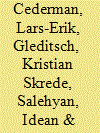| Srl | Item |
| 1 |
ID:
120168


|
|
|
|
|
| Publication |
2013.
|
| Summary/Abstract |
A series of studies has shown that civil wars are caused not only by factors inside countries, but also by effects operating across state borders. Whereas a first wave of quantitative studies demonstrated that such effects make the "closed-polity" assumption untenable, more recently researchers have identified particular causal mechanisms driving conflict. Despite these recent advances, a central puzzle remains unresolved, namely why ethnic groups that at least in theory could count on support from large transborder ethnic kin (TEK) groups often have remained surprisingly peaceful, such as the stranded Russian populations in the "near abroad." We propose a theoretical framework that extends the analysis from the primary dyad between the incumbent and the challenger group by adding a secondary dyad that pits the incumbent against the TEK group. We postulate a curvilinear effect of the TEK group's relative size on conflict onset. Using a new data set on transnational ethnic links, we find that that the risk of conflict increases within the middle range of the size spectrum, consistent with our main hypothesis. This means that large TEK groups have a conflict-dampening effect, provided that they control their own state. Excluded TEK groups, however, are not associated with lower conflict probabilities.
|
|
|
|
|
|
|
|
|
|
|
|
|
|
|
|
| 2 |
ID:
169280


|
|
|
|
|
| Summary/Abstract |
Previous literature explains peace negotiations mainly with country-level factors or events related to the countries where the peace efforts take place. This closed polity approach contrasts with contemporary peace processes where the actors and demands transcend nation-state boundaries. This paper challenges this dominant understanding in the peace process literature and focuses on the role of the rebel groups’ transborder kin connections in affecting peace process dynamics. By studying the Kurdish Peace Process conducted between the Government of Turkey and the PKK, the paper argues that the transborder kin connections can both remedy and exacerbate bargaining problems acute to peace processes.
|
|
|
|
|
|
|
|
|
|
|
|
|
|
|
|